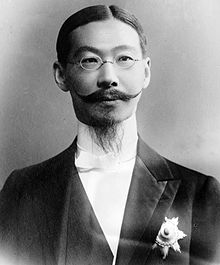Lu Zhengxiang
Lu Zhengxiang ( Chinese 陸徵祥 / 陆征祥 , Pinyin Lu Zhengxiang , W.-G. Lou Tseng-Tsiang ; Pierre-Célestin ; born June 12, 1871 in Shanghai , Empire of China , † January 15, 1949 in Bruges , Belgium ) was a Chinese Politician and diplomat , who was Prime Minister in 1912 and Secretary of State between 1915 and 1916, twice head of government of the Beiyang government and several times foreign minister of the Republic of China . After completing his diplomatic career, he settled in 1927 as a Benedictine with the religious name Pierre-Célestin in the Abbey of Saint-André in Bruges.
Life
Ambassador, Foreign Minister and Prime Minister 1912
Lu, a believer in Christianity , spent most of his childhood abroad so he was not fluent in Chinese . During the Qing dynasty he entered the foreign service and was later ambassador to the Netherlands and, most recently, from September 1, 1911, ambassador to Russia .
After the Xinhai Revolution and the overthrow of the monarchy and the proclamation of the Republic of China on January 1, 1912 Lu became the first Minister of Foreign Affairs in the cabinet of Prime Minister on March 30, 1912 Tang Shaoyi appointed, with between 30 March and 10 June 1912 Hu Weide temporarily held the ministerial office. He himself took up the ministerial office on June 10, 1912 after his return from Saint Petersburg and held it until he was replaced by Liang Ruhao on September 22, 1912.
After Tang resigned on June 27, 1912, he succeeded him as prime minister. However, he was so unfamiliar with Chinese affairs and his inaugural address so far-fetched that members of parliament decided to withdraw his nomination. Shortly afterwards, however, they agreed after they were told that Otto von Bismarck had behaved in the same way. A few weeks later, however, Zhao Bingjun succeeded him on September 25, 1912 in the office of Prime Minister. This then appointed him on November 15, 1912 as the successor of Liang Ruhao as foreign minister again. Lu also held this post in the Cabinets of Prime Ministers Duan Qirui and Xiong Xiling until September 4, 1913 .
Secretary of the State 1915 to 1916 and Paris Peace Conference 1919
As the successor to the resigned Xu Shichang , Lu took over the office of secretary of the state in December 1915 and thus became head of government of the republic for the second time. He held this office until March 22, 1916, when he was replaced by his predecessor, Xu Shichang. At the same time he again held the office of Foreign Minister from January 27, 1915 to May 17, 1916.
On November 30, 1917, he took over the office of Foreign Minister for the fourth time, replacing Wang Daxie . He remained in this office for nearly a year until November 12, 1918, serving under Premier Weng Shizhen , Duan Qirui and Qian Nengxun . His successor was then provisionally Chen Lu .
After the end of the First World War , Lu became the representative of the Republic of China at the Paris Peace Conference on January 18, 1919 . China wanted the German Kiautschou colony in Shandong to be returned to China. With the treaty, however, the German colony in Shandong was ceded to Japan . The decisions of the Paris Peace Conference generated great dissatisfaction and disappointment among the Chinese and aroused strong nationalist and anti-Japanese sentiments. This led to the May Fourth Movement in 1919. As a result, the two Chinese delegates Lu and Gu Weijun refused to sign the peace treaty because it did not take China's wishes into account. However, this was in contradiction to the instructions from the Chinese government.
After his return to China, Lu became Foreign Minister on December 3, 1919, succeeding Chen Lu for the fifth time and held the ministerial office until August 13, 1920 in the governments of Premier Jin Yunpeng and Sa Zhenbing .
Ambassador to Switzerland and Benedictine monk
In 1922 he received his accreditation as ambassador to Switzerland , where he represented the interests of the Republic of China until 1927.
Converted to Catholicism in 1912, he entered the Benedictine Abbey of Sint-Andries in Bruges (Sevenkerken) in 1927 with the religious name Pierre-Célestin (professed January 15, 1929), was ordained a priest in 1935 and in 1946 by Pope Pius XII. appointed as Dom Lou Honorary Abbot of St. Pierre in Ghent. As a clergyman, he has published several books dealing with religious subjects as well as personalities such as the scholar Xu Guangqi and the French mystic Élisabethleseur .
Publications
- La Vie et les oeuvres du grand chrétien chinois Paul Siu Koang-k'i , 1934
- Conférence sur madame Elisabethlesenur , 1943
- Allocution de Dom Lou, abbaye de Saint-André le samedi 10 août 1946 fête de Saint Laurent , 1946.
- Lettre à mes amis de Grande-Bretagne et d'Amérique , 1948.
- La rencontre des humanités et la découverte de l'Évangile , 1949
Web links
- Short biography in rulers.org
Individual evidence
- ↑ Minister of the Republic of China 1912 to 1928 (rulers.org)
- ↑ Prime Minister of the Republic of China (rulers.org)
- ^ Weißenberger, Paulus: Benedictine monasticism in the 19th and 20th centuries. Century, Beuron 1953, no.663
| personal data | |
|---|---|
| SURNAME | Lu, Zhengxiang |
| ALTERNATIVE NAMES | 陆征祥; 陸徵祥; Lou, Tseng-Tsiang; Brother Pierre-Celestin |
| BRIEF DESCRIPTION | Chinese politician, diplomat and Benedictine |
| DATE OF BIRTH | June 12, 1871 |
| PLACE OF BIRTH | Shanghai , Empire of China |
| DATE OF DEATH | January 15, 1949 |
| Place of death | Bruges , Belgium |


